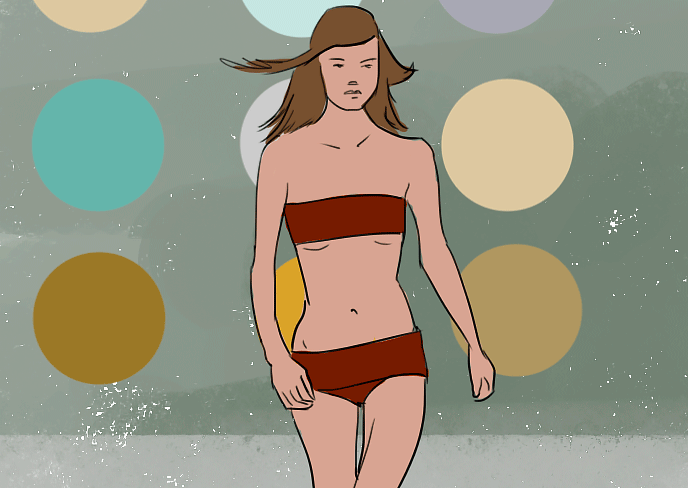Anorexia: Its Symptoms, Causes and Types
Anorexia is a syndrome when a person does not feel like eating at all while there is an objective need in nutrition. Anorexia goes along with metabolic diseases, infectious diseases, alimentary system pathology, and parasitic invasions psychiatric conditions. 
We have already faced with cases of different diseases in one of our previous articles. Anorexia though is connected with eating disorders.
Causes of occurrence
Anemia, diabetes, alcoholism, narcotic addiction, thyrotoxicosis, intoxication, anxious phobias, different infections, depression, immune and hormone disorders. Anorexia nervosa is very much in evidence lately, which, as a rule, goes along with anxious disorders of mind. It seems for a person with anorexia nervosa that s/he has overweight, is impatient with one`s own body. Patients differing from mental anorexia refuse to consume food, put themselves to strenuous physical activities.
Anorexia may be a result of children to have insufficiency of hypothalamus and autism.
Chronic pathology of organs and systems may cause a disease. Endocrine disorders are among them (pituitary deficiency, hypothalamic failure, hypothyroidism), gastrointestinal diseases (pancreatitis, gastritis, hepatitis and liver cirrhosis, appendicitis), chronic insufficiency of kidney function, malignant neoplasms, chronic pain of any etiology, protracted fever (as a result of infections or metabolic disorders), dental diseases. Our writers are able to prove with more information on this and other matters if required.
Symptoms
Cardinal symptoms are massive weight loss, expressed loss of appetite. Patients suffer from interrupted sleep, general weakness and muscle cramps. Flabby or atrophied muscles are typical, thin subdermal sebaceous interlayer, flat stomach and hollow eyes, falling of teeth, brittle nails, liver spots on the skin, extravasation on the body, xerasia, low arterial tension, decreased libido, mood swing, paleness, and menstrual disorder. Cardiac arrhythmia is caused by lack of calcium, magnesium and other minerals and vitamins causing vertigo, faintness and cardiac arrest emergency in some cases in its turn. There are stomach pains, constipation, sometimes sickliness and vomiting affecting alimentary system. Anorexia can provoke depressive condition.
Diagnostics
In order to detect anorexia, body weight index is determined. To calculate it, one should divide a person`s weight in kilograms into one`s height in meters squared. Normally it is equal to range in the interval from 18, 5 to 25. Range of the index less than 16 speaks of expressed deficiency of body weight. In addition, clinical blood analysis, clinical urine analysis, detection of hormone level, biochemical blood assay are important during diagnostics. Gastroscopy, actinography, electrocardiography shows the intensity of disease, probable consequences.
Types of disease
There are, as have already been mentioned, psychic anorexia (psychic disorders going along with losing a feeling of hunger, schizophrenia, paranoia, depression). It also may occur as a result of consuming psychotropic substances. Symptomatic anorexia is a symptom of general medical condition (pulmonary disease, qwerty tummy, endocrine system, gynecological disorder). Anorexia nervosa (a person stints oneself in food consciously). Drug anorexia (anti-depressants, psychostimulants and other medications overdosing).
Treatment
While secondary anorexia, the primary one undergoes treatment. Nutrition is restored gradually in order to prevent possible complications in the form of swellings, damage of alimentary system organs, metabolic disorder. At first, a low calorie food is consumed in small portions, going to more nutritious products stepping up the doses. During therapy of severe cases, intravenous induction of nutrient materials is performed.
Hormone therapy is prescribed in cases of endocrine system damage. Psycho therapy and antidepressants are prescribed for a primary anorexia case. Multivitamin preparation and dietary supplements are recommended.
Complications
Hormone changes are among possible complications (thyroid body hormone deficiency, of reproductive hormones, cortisol, somatotropin), heart disease (hypotension, anisorhythmia, heart muscle reduction, poor blood circulation), sexual function disorder, changes in supporting-motor apparatus (osteopenia, osteoporosis), blood diseases (anemia), intestine issues (organ dystrophy).
Preventive measures
In order to prevent a disease, one should follow optimal ration, to avoid damaging exercise, stress situations.
Our service is superb when it comes to essay writing and other types of academic papers. It goes without saying that once you or anyone you know feels like suffering from anorexia, ask for medical help immediately.
***